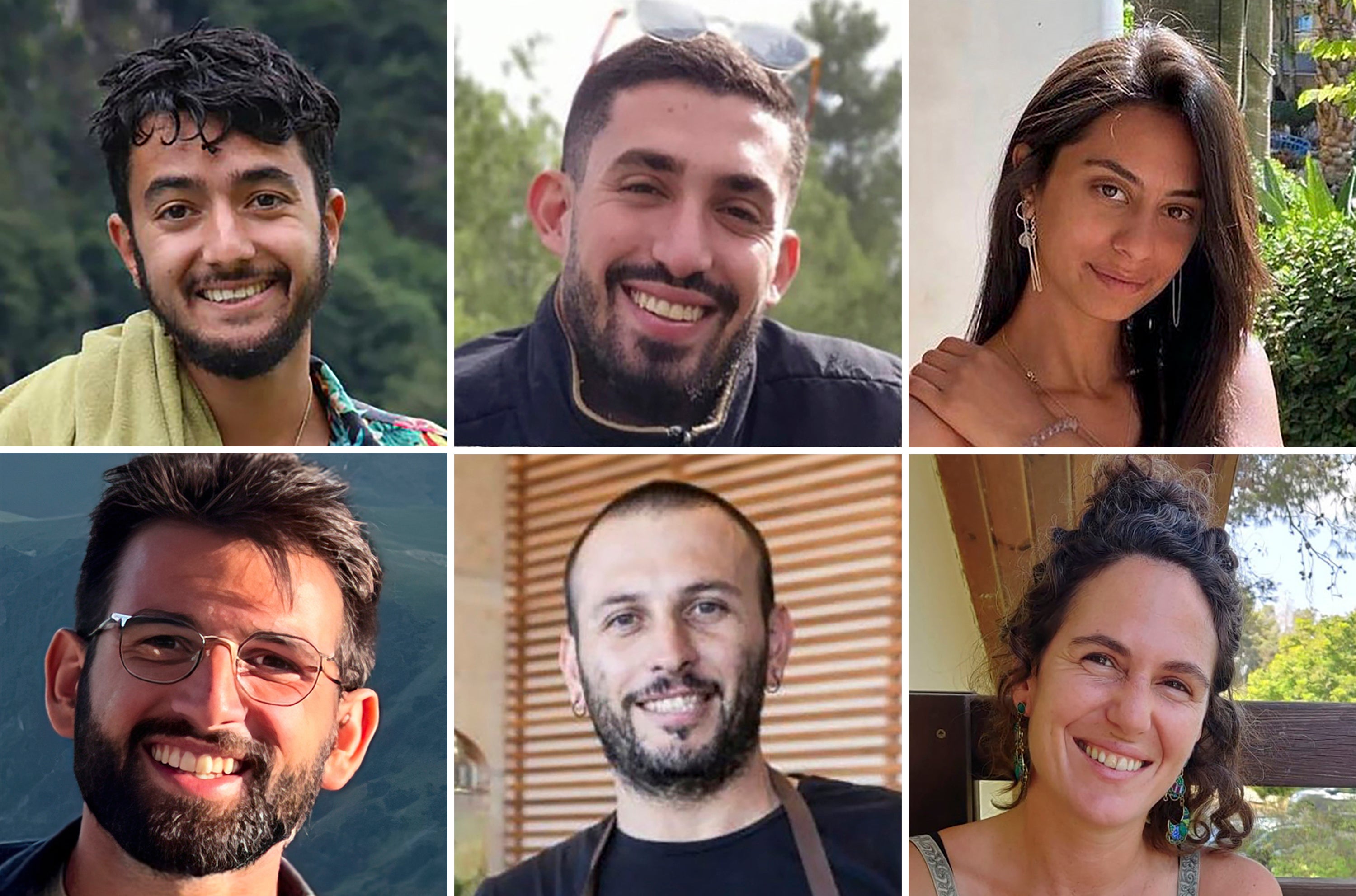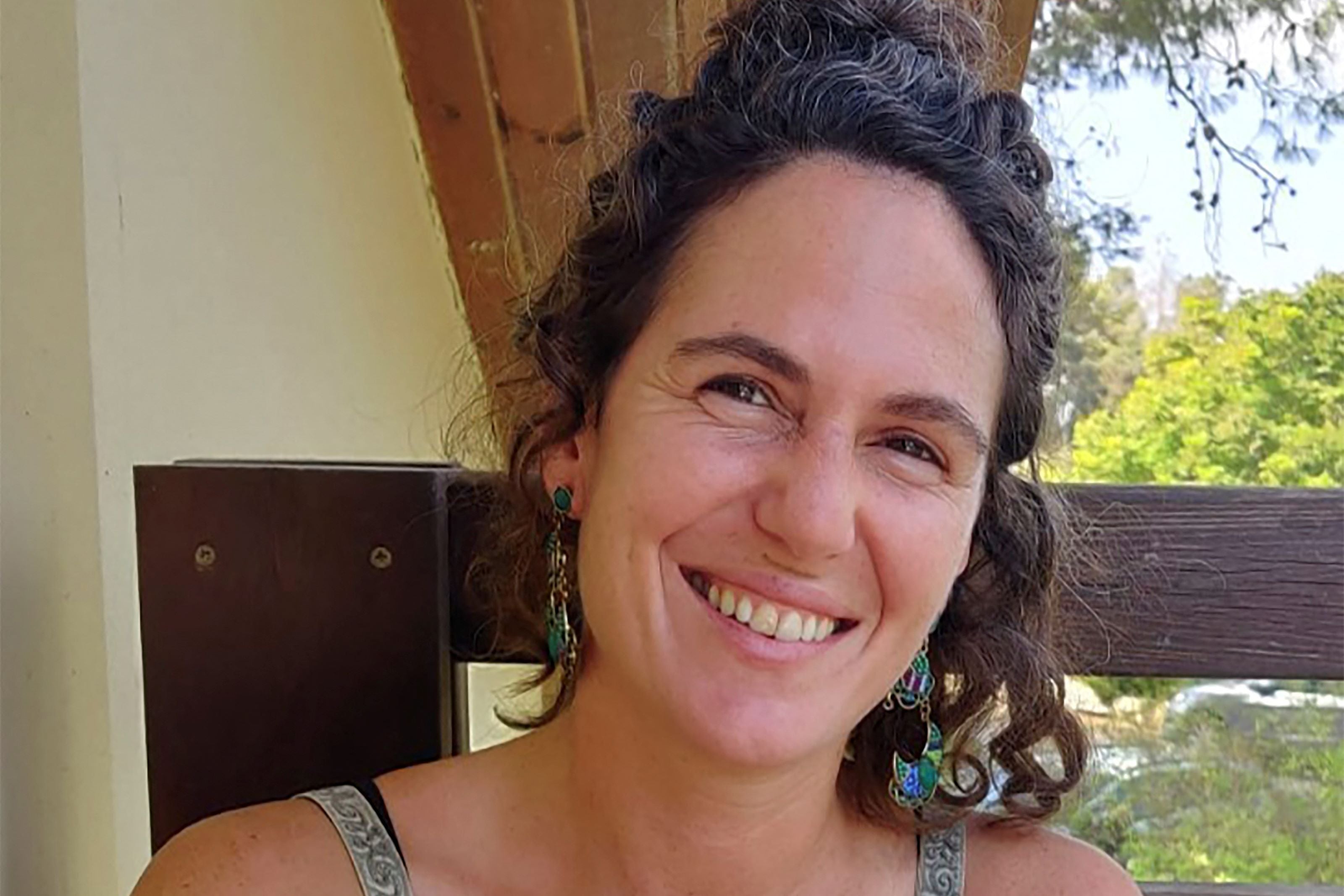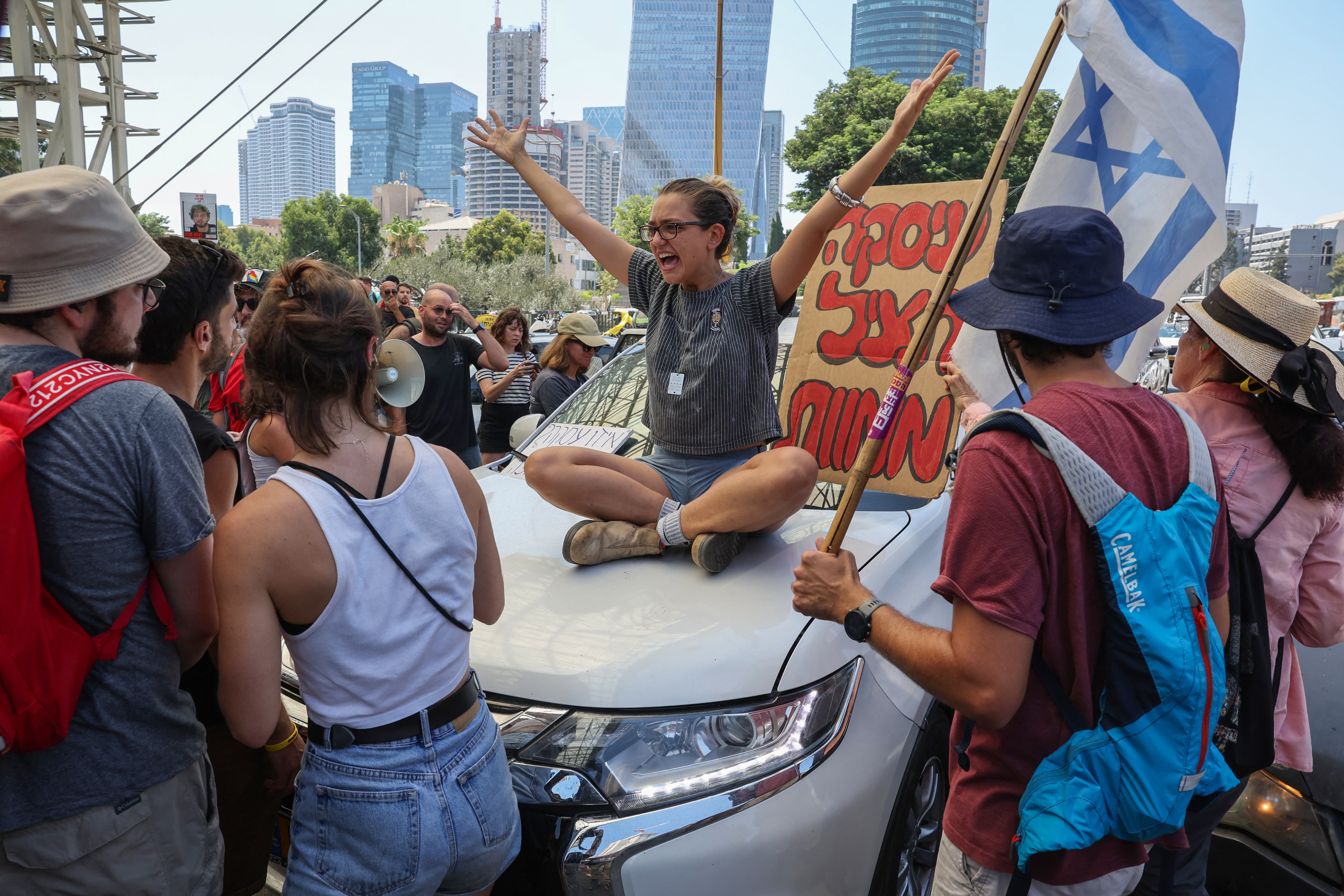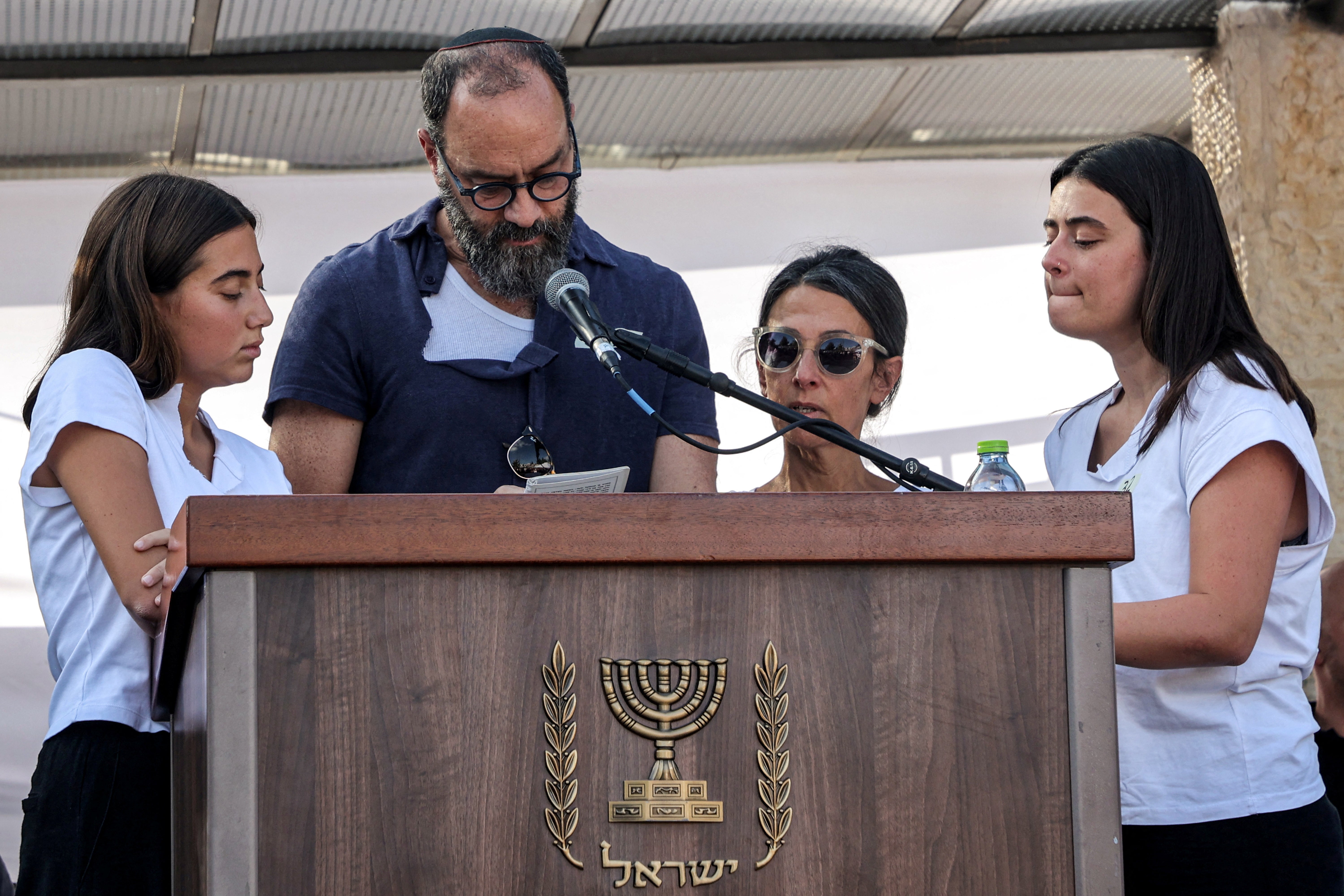Family of killed Israeli hostage beg Netanyahu to agree Hamas truce amid nationwide strike and protests
Israeli PM defies nationwide protests and says ‘our nation will not surrender’ to international pressure after six hostages were killed in Gaza
Your support helps us to tell the story
As your White House correspondent, I ask the tough questions and seek the answers that matter.
Your support enables me to be in the room, pressing for transparency and accountability. Without your contributions, we wouldn't have the resources to challenge those in power.
Your donation makes it possible for us to keep doing this important work, keeping you informed every step of the way to the November election

Andrew Feinberg
White House Correspondent
A distraught cousin of one of the six hostages killed in Gaza issued a heartfelt plea to Benjamin Netanyahu to sign a truce deal and retrieve the remaining captives, as Israel was gripped by a nationwide strike and angry street protests.
Hundreds of thousands of Israelis gathered across the country in a show of anger and grief after the hostages, including an American-Israeli citizen, were found dead. They had been shot by Hamas militants just before IDF soldiers were able to rescue them from a tunnel, Israel’s military said.
Gil Dickmann, whose cousin Carmel Gat, 40 was among the dead, told The Independent that three of them had been marked for release in the most recent draft deal to which they had hoped Israel would agree.
“All six of them were alive,” he said. “All six of them were held together, all six of them were killed in captivity, and we could have saved all of them.”
In an emotional plea, Mr Dickmann urged the world to keep “trying everything” to reach an agreement that would allow other hostages to be brought out.
“I don’t want any more families to feel this way,” he said. “I want them and us to do whatever we can to save the lives of the hostages. Maybe something will touch Netanyahu.”

Mr Dickmann has led dozens of marches calling for an exchange agreement and was even briefly arrested inside the US Capitol in July while protesting during Mr Netanayhu’s speech to Congress.
In a post on X, he captured the anguish of the families in a message to his cousin: “Sorry we let them kill you. Sorry, Carmel. Sorry I didn’t do enough. I promise you: in your memory, we will return them all.”
His words echoed those of Jon Goldberg-Polin, whose son Hersh, 23, an American-Israeli citizen, was also among the six dead.
At Hersh’s funeral in Jerusalem on Monday, Jon said the family hoped this might be a turning point in drawn-out negotiations for a ceasefire and hostage release.

“We failed you, we all failed you,” Mr Goldberg-Polin said. “Maybe your death is the stone, the fuel, that will bring home the 101 other hostages.”
Hersh, a native of Berkeley, California, lost part of his left arm to a grenade in the Hamas attack on 7 October. He appeared alive in a video issued by Hamas in April and was also set to be freed.
Carmel, an occupational therapist from Tel Aviv, was abducted from Kibbutz Be’eri in the attack. She had been visiting her mother, who was killed. Carmel had been included in a list of those due to be exchanged in the latest ceasefire.
Mr Dickmann said Carmel and Hersh were alive between 48 and 72 hours before their bodies were discovered.
“We were trying everything to tell our government and to tell the governments of the world that a ceasefire is the most urgent thing,” he said, his voice cracking. “We were very, very close to getting them [home] in a deal, closer than we want to believe because it’s a tragedy.”

He blamed the Netanyahu government’s decision to demand more conditions in the latest ceasefire deal – including a continued Israeli military presence along the so-called “Philadelphi corridor” between Egypt and Gaza.
“I think many of the ministers don’t understand that what they voted for is the execution of hostages,” he said. “Unfortunately, that was the end for Carmel and the others.”
Israel’s beleaguered prime minister is facing his biggest political crisis since the start of 11-month war in Gaza, as a wave of grief and rage has gripped the country.
Mr Netanyahu is accused by many Israelis of prioritising his political survival by pandering to hawkish extreme-right members of his cabinet and so deliberately scuppering a deal.
His government has also come under searing criticism from abroad. President Biden on Monday accused him of not doing enough to secure a hostage release.

The president told reporters he had been close to presenting a final proposal for a deal this week. “We’re very close to that... hope springs eternal,” he said.
Asked if he thought Mr Netanyahu was doing enough, Mr Biden replied: “No.”
But while Mr Netanyahu asked Israelis for “forgiveness” over the hostages, he doubled down on his conditions for a deal, including the so-called Philadelphi corridor.
“The axis of evil needs the Philadelphi corridor, and for that reason we must control the Philadelphi corridor,” he told a news conference in Jerusalem.
“I’m asking for your forgiveness that we didn’t manage to bring them back alive, we were close but we did not achieve it,” he said late on Monday. “Hamas will pay a very heavy price for that.”
He added: “I will not surrender to this pressure… our nation will not surrender to this pressure.”
Foreign secretary David Lammy announced he was suspending around 30 of approximately 350 arms export licences to Israel amid concerns a “clear risk” exists that they could be used to breach international humanitarian law.
Mr Lammy said the government did “not take this decision lightly” and stressed it is “not an arms embargo”.
Business secretary Jonathan Reynolds said the suspension would include components for fighter aircraft, parts for unmanned aerial vehicles, naval systems, and targeting equipment.
Israel launched a crippling siege and its heaviest-ever bombardment on Gaza in retaliation for Hamas’s attacks on southern Israel during which militants killed over 1,000 people and took more than 250 hostage.
At least 20 of the captives taken alive have been murdered in captivity, according to the hostages’ families. More than 100 remain inside Gaza.
Since 7 October, Israel’s offensive has killed more than 40,700 people in Gaza, the vast majority women and children, Palestinian health officials say. The United Nations has reported the first outbreak of polio in 25 years and says the 26-mile strip is on the brink of famine.
Subscribe to Independent Premium to bookmark this article
Want to bookmark your favourite articles and stories to read or reference later? Start your Independent Premium subscription today.

Join our commenting forum
Join thought-provoking conversations, follow other Independent readers and see their replies
Comments